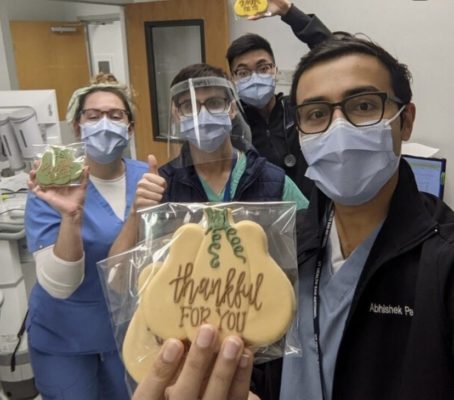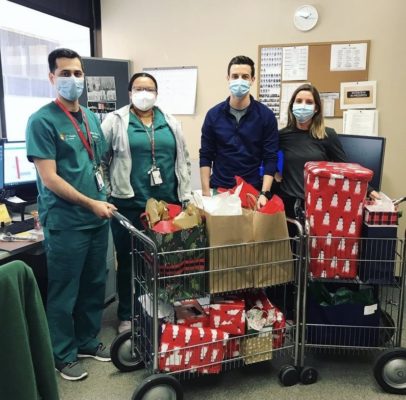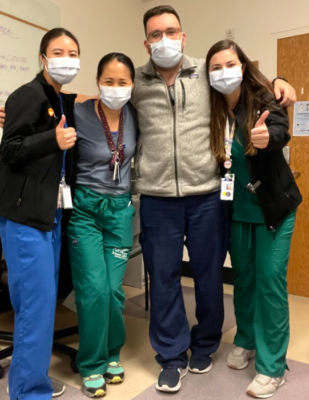Resident Wellness
Residency Wellness Activities
 We are committed to several domains of resident wellness and have created multiple avenues for communication between residents and program leadership for feedback and exchange of ideas.
We are committed to several domains of resident wellness and have created multiple avenues for communication between residents and program leadership for feedback and exchange of ideas.
Our Chief Resident of Wellness facilitates activities both inside and outside of the working environment including: monthly social events, community service activities, small group meetings, mentorship programs, didactics covering resident fatigue and burnout, cohort families and innovative scheduling that ensures residents have adequate time for clinical work, academic activities and coveted golden weekends (X+Y scheduling).
Cohort Families
 Residents are divided into 5 cohorts consisting of residents from each PGY level based on their “+1” (or continuity clinic) week. Together with a chief resident and an associate program director, this creates a family, which promotes a stronger sense of community and creates camaraderie within the larger program.
Residents are divided into 5 cohorts consisting of residents from each PGY level based on their “+1” (or continuity clinic) week. Together with a chief resident and an associate program director, this creates a family, which promotes a stronger sense of community and creates camaraderie within the larger program.
Families collaborate on a year-long QI project, host small gatherings throughout the year, and participate in inter-residency competitions, such as food drives
Social and Community Service Activities
Each cohort elects a Wellness Liaison that works directly with the Chief Resident of Wellness to facilitate cohort events and participation in community service. Previous community service projects have included cohort family competition food drives and Adopt-A-Family annual holiday drive.
On a larger scale, we have various residency wide social events throughout the year. These events include our Intern Welcome gathering, “We Survived July” gathering, Family Zoo day, Halloween party, Friendsgiving and many more! We host two large events each year, our Holiday gathering in December and our End of the Year Banquet in June.
Diversity and Inclusion
We strive to ensure that all of our residents find a sense of belonging with us, no matter their gender expression, religion, nationality, sexual orientation, or disabilities.
We take great pride in our diverse residents, who represent over ten countries. We celebrate our diversity during a monthly cultural diversity noon conference in which one or our residents shares their home country or state with the rest of the program. We learn about the history of their communities, family dynamics, languages spoken, fashion style, music composition, and highlights of their healthcare system, while we share food from the region. Our residents take great pride in sharing their homes with us and we take great pride in celebrating with them.
Coaching
Coaching is an emerging field in medical education. The benefits of coaching were found to promote professional growth and well-being in many kinds of literature. Our program allows our residents to meet 1:1 with a professional coach Dr. Kanapa Kornsawad. Dr. Kornsawad has been an APD and certified professional coach since October 2022. She has been coaching our residents and faculty from within and outside our department, giving talks to other programs, and serving as a volunteer coach for Better Together Physician Coaching program.
Mentorship
The responsibilities and stress of internship and residency are substantial. Research studies have demonstrated that effective mentoring helps residents to meet their personal and professional goals. Our Resident Mentoring Program (RMP) has been established to provide the incoming categorical intern each year with an assigned mentor based on their careers plans and personal interests. The primary focus of the mentoring relationship is on career development and personal needs. The program strives to create a confidential, durable and comfortable relationship between faculty and residents that is not part of the resident’s formal evaluation.
We kick off our mentorship at the beginning of each academic year with an ice cream social during intern orientation. PGY-1s are assigned both a resident and faculty mentor. Mentorship is 1:1 matched based upon a questionnaire completed by the PGY1 applicant. Mentors meet periodically throughout the year. Faculty mentors are typically a general internal medicine physician (hospitalist or primary care physician) and serve as a great avenue for career advice, support for struggling residents, and have a wealth of resources. Resident mentors serve as an excellent resource and provide advice from the perspective of an upper level resident.

The Helping Interns Train (HIT) team
One of the most challenging times for residents is the beginning of the PGY1 year. Lack of familiarity can hamper efficiency and be a source of frustration and stress. Our HIT team (“Helping Interns Train”) is deployed to help ease the transition and minimize the stress of initial adaptation to a new system of care. Upper level residents volunteer to assist our new interns navigate our systems by sharing EMR tips, walking through a medication reconciliation and discharges, logistics of calling a consultant, and much more. Upper level residents deployed for the HIT team report a great sense of satisfaction in helping new residents make an easier transition.
Intern to Resident Retreat
The transition from PGY-1 year to PGY-2 year is a milestone that we celebrate at our annual Intern-to-Resident retreat. With the transition comes the excitement of a new role, as well as the stress and anxiety of new responsibilities. The retreat curriculum includes: sessions about how to be a successful upper level resident, management strategies for inpatient wards/critical care teams, and so much more. Team building activities and time for recreation are included in the retreat.
Wellness Didactic Curriculum:
Dedicated wellness curriculum is offered during residents’ ambulatory weeks throughout the year, focused on topics such as recognizing and combating burnout, as well as compassion fatigue and mortal distress.
House Staff Issues:
The Chief Residents conduct a quarterly meeting during which residents are welcomed to openly share feedback regarding the program and suggestions for change.
Program Evaluation Committee (PEC):
Due to the large size of the medicine program and the diversity of the rotations, the Program Evaluation process is designed as a continuous effort to provide information and get feedback about the program. An Associate Program Director conducts quarterly PEC meetings to evaluate each rotation and the annual ACGME survey results with resident feedback. Open discussion and feedback to encouraged as we strive to continuous improvement of our residency.
Class Representatives:
One resident from each PGY level is selected by their peers to represent their class and voice anonymous suggestions and feedback from the residents.
We welcome any questions or comments you may have about our Wellness Initiatives and look forward to you joining our residency family!
[/vc_column][/vc_row]
